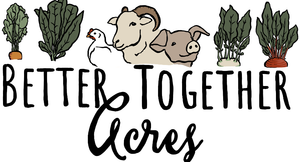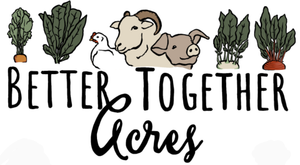CSA FAQ and Waitlist
Do you offer smaller shares? At this time, no. But if you know someone else who's interested in a box, we do have members who split their box with a friend or coworker, or who alternate delivery weeks.
Do you still offer deliveries? Following years of offering delivery to certain areas, we no longer will do deliveries this season. The multiple hours lost off-farm on the road every week, as well as the time spent packing/unpacking were creating bottlenecks for our family. This became a particular issue as the season went on and daylight decreased, leading to caring for our animals in the dark when it simply wasn't best for both us and them.
What if I go out of town and must miss a box? Check in with a friend and see if they may want to pick it up or take your box. You can also let us know and we are happy to donate your share to a local food pantry for that week.
What is Community Supported Agriculture (CSA)? CSA stands for "Community-Supported Agriculture." It's a partnership between a farm and its community. CSA members pay a subscription fee at the beginning of the growing season, which the farm then uses to buy seeds and supplies. In return, the farm harvests “the cream of the crop” for members each week. The CSA model creates a direct connection between farmers and eaters.
What kinds of vegetables will I receive? Each week, you’ll receive the freshest vegetables in season. We grow about fifty types of vegetables and herbs, and strive to provide a wide variety week-to-week – there’s always something you love and never too much of something you’re tired of.
Here are sample weeks for early, mid, and late season:
Early Season:
Microgreens, Spinach, Sugar Snap Peas, Beets, Bok Choy, Scallions, Radishes, Baby Kale, Carrots, Cilantro
Mid-Season:
Head Lettuce, Hakurei Turnips, Broccolini, Green Beans, Cucumber, Eggplant, Cipollini Onions, Cherry Tomatoes, Bell Pepper, Arugula, Basil/Parsley
Late Season:
Salad Mix, Leek, Shishito Peppers, Cauliflower, Cabbage, Kohlrabi, Carrots, Asian Greens, Squash, Daikon Radish, Dill/Fennel
Do you use chemicals? No! We never use any kind of chemicals on our vegetables ever.
Are your vegetables organic? Yes, except in one sense: we're not certified organic. In the future, we would consider becoming certified, but for now, the paperwork and costs don't make sense. We rigorously follow organic practices on the farm: we use no synthetic pesticides or fertilizers, we use no GMOs, we plant habitat for pollinators, and we use lots of compost to nourish the soil. You're welcome to visit the farm to see for yourself!
What are your growing practices? We do everything by hand, with a gentle approach that aims to model natural systems. We practice no-till farming which means that we plant/harvest crops without disturbing the soil via tilling or plowing. Instead, our soil is left intact and a layer of organic material, such as crop residues, remains on top. This practice has several benefits, including improved soil health, increased carbon sequestration, better water retention, and more nutrient dense food. We believe healthy soil leads to healthy plants and animals, and ultimately, healthy people.
How many weeks does your CSA run for? We run our CSA for a total of 20 weeks, beginning on June 12 through October 23.
Pick-up is Thursday of each week.
What are the benefits of joining our CSA? Joining our CSA has many benefits, including access to fresh, locally-grown produce, the opportunity to support regenerative farming practices, and a sense of community with fellow members and us the farmers.
Do you offer more than just vegetables? Yes - we are glad you asked! We will be offering a pastured Chicken add on and first dibs to our popular pastured Turkeys for Thanksgiving, as well as forest-raised Pork in October. In addition, we will offer a fresh, local Mushroom add-on through a farm with whom we partner. Finally, we also offer a small number of pastured Eggs but sell out frequently so be sure to check our online store for availability each week.
How much produce can I expect? Weekly shares run between 7-10 items and is best suited for families of 2-4.
What if I want to add more to a certain week? No problem! You can always add more vegetables to your box by visiting our Farm Store when you pick up on Thursday, or during Farm Store hours - more to come on this!
What are the advantages of eating locally grown produce? Eating locally grown produce has many advantages, including fresher and more nutrient-rich food, reduced carbon emissions from transportation, and supporting local farmers and the local economy. Become a locavore!
How does joining a CSA support local farmers and the local economy? Joining a CSA supports local farmers, which increases food resiliency, by providing them with a reliable market for their produce. It also supports the local economy by keeping money in the community.
How can joining a CSA help reduce your carbon footprint? Joining a CSA can help reduce your carbon footprint by reducing food miles, i.e. the distance that your food travels from farm to table, thus reducing the emissions associated with transportation.
We will open our CSA Sign-Ups on January 1st on a first come first serve basis.


